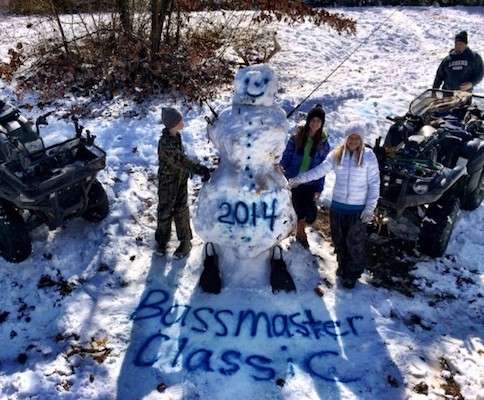
A handful of anglers competing in the 2014 Geico Bassmaster Classic presented by Diet Mountain Dew and GoPro may be comfortable fishing in frigid conditions.
But it’s fair to say that the majority of them would prefer some milder weather when bass fishing’s biggest event is held on Alabama’s Lake Guntersville on Feb. 21-23.
It’s anybody’s guess what to expect from Mother Nature when the Classic begins, though early predictions call for temperatures to reach the mid-60s by the beginning of next week.
That would be a vast difference from what Guntersville (and almost of all of the Deep South,) has experienced since 2014 began. Southern states from Arkansas to the Carolinas have had several battles with sleet, ice and snow in the past six weeks, and the effect has been tangible. Schools and government offices periodically have been closed, motorists have been stranded on frozen roads, and travel has been reduced to gridlock during the worst of the weather.
“Snowpocalypse,” some have called it.
Keith Floyd, the Fisheries Supervisor for District 1 of the Alabama Department of Conservation and Natural Resources, said it’s been 15 years since his area of the state has felt the chill of single-digit temperatures at multiple times in a month. Still, Floyd said the greatest obstacle the weather presents on a fishery such as Guntersville isn’t always the temperature, but it’s in part the effect such weather can have on aquatic vegetation.
“It’s been five weeks on and off of freezing temperatures,” Floyd said on a recent Tuesday, when state offices were closed because of a winter weather cautions. “It will affect the fishery just like it would any other place. When it’s cold, the fish just don’t move as much. And when they do, they feed very lightly.
“But when it warms up, they get biting pretty quickly,” he continued. “It all depends on the days of sunlight we get really. If you get sunlight, it will warm up fairly quickly; within a couple days. But when it stays cloudy, even if it’s getting warmer, the vegetation takes longer to get going.”
Sunlight, of course, has a direct relation to the growth of aquatic vegetation – the submerged plant life that harbors the bait bass love to eat, as well as provides shelter for the bass themselves. Without it, the system doesn’t work as efficiently as it would in the spring.
Milfoil and hydrilla are both hearty, subtropical plants that are prevalent at Guntersville. Floyd said there may not be as much vegetation in the Tennessee Valley system this year because of extremely cold weather, but that those plants are far from gone at Guntersville. They are submerged, however, and not readily visible on the surface of the massive body of water.
“I haven’t been on it in a while, but the word of mouth I get from people that have fished at Guntersville the past few weeks, they say there is still some grass,” Floyd said. “But it’s on the beds, not on the surface. The key at Guntersville is that you don’t have the drastic draw-down (of water) like you do on some other reservoirs. There aren’t mud flats there like there are in other places where there’s a great deal of draw-down.”
So despite the daunting weather seen in northern Alabama recently, Floyd doesn’t seem to be overly concerned with Guntersville’s ability to produce big bass next weekend.
And why should he be? In one recent tournament held there (in-between bouts of extreme cold,) a 32-pound, one-day bag was caught. In a different tournament the following weekend, a 24-pound bag was produced.
Floyd said with the seasoned B.A.S.S. anglers on the water, those numbers can be duplicated – or bettered. That’s a point of pride for him and other Alabama fisheries officials.
“We manage Guntersville, so we like to see that,” he said. “There’s a lot of pressure in there, especially in the spring, but I don’t think there will be too much for this tournament. They’ll have people come out and watch, but not all of them will fish. It may just be too cold for some of them.”

